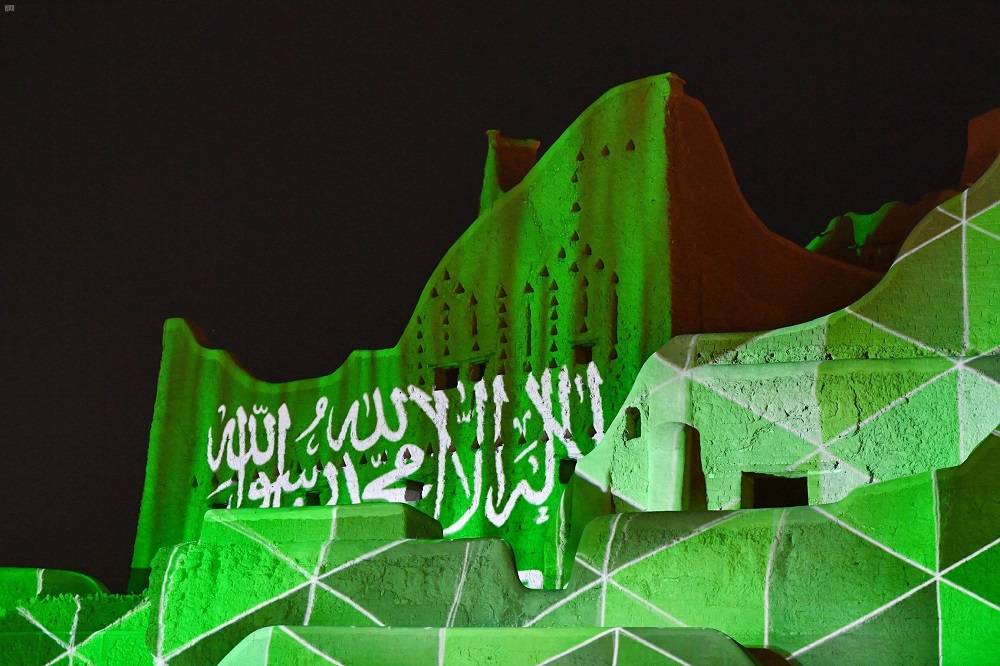Diriyah, the birthplace of the first Saudi state, was the starting point for Imam Mohammed bin Saud’s unification drive, marking a shift from a city-state to a centralized government aimed at uniting the Arabian Peninsula under a stable political framework.
For centuries, Diriyah stood as a key stop along trade caravan routes stretching from the Red Sea to the Gulf of Basra.
It gained renown for its beautifully built stone houses, was intersected by Wadi Hanifa, and has long been home to mosques and schools.
The surrounding fields yielded wheat, barley, and millet, alongside orchards of date palms, peaches, and figs. Diriyah was also a breeding ground for a distinguished lineage of purebred Arabian horses, whose reputation extended across kingdoms and beyond.
The origins of Diriyah’s name have been the subject of debate for centuries, yet it has retained its historical title to this day. It was also known as “Al-Awja,” a name that sparked discussions over its meaning. King Salman ultimately settled the debate, affirming that “Al-Awja” is a geographic reference to Diriyah itself.
Saudi Arabia has launched strategies and programs to develop Diriyah across urban, cultural, economic, and social dimensions, recognizing its historical significance as the first Saudi capital. Once a dominant regional power, Diriyah played a pivotal role in Saudi Arabia’s political history before suffering widespread destruction at the hands of Ottoman forces in the early 19th century, which left much of it abandoned.
Mega-development
The city is now part of Saudi Arabia’s major development projects. On January 9, 2023, Prince Mohammed bin Salman, Crown Prince, Prime Minister and Chairman of the Public Investment Fund (PIF), announced the inclusion of the Diriyah project as the fifth mega-development under PIF ownership.
The move positions Diriyah as one of the world’s most unique cultural, heritage, and tourism destinations.
The Diriyah Gate Development Authority (DGDA) will continue overseeing and regulating the area to preserve its historical and cultural legacy. It will also support the local community while ensuring that Diriyah evolves into a premier global tourism destination.
The DGDA was established on July 20, 2017, as a Saudi government entity tasked with transforming Diriyah’s urban, cultural, and economic landscape. Given its historical significance, the authority aims to position Diriyah as a premier global destination—a place where the world converges—while ensuring it remains a source of pride and heritage for all Saudis.
DGDA’s mission is to make Diriyah a national landmark and a symbol of Saudi unity, inspiring development into an exceptional international attraction.
Central to this vision is preserving Diriyah’s historical gem, the At-Turaif district, a UNESCO World Heritage site.
The authority is committed to safeguarding the area’s historical and cultural identity, ensuring Diriyah becomes an unparalleled global destination.
It also seeks to transform Diriyah, Wadi Safar, and Al-Bujairi into vibrant hubs of hospitality, leisure, and retail, blending cultural authenticity with world-class experiences.
Additionally, the DGDA aims to be a responsible neighbor, fostering an enabling environment that enhances local services and infrastructure, creating a thriving and exceptional community.

As part of its development plans, the DGDA has signed several agreements, including a memorandum of understanding with King Abdulaziz City for Science and Technology (KACST) to establish a strategic partnership. The collaboration focuses on boosting joint planning, optimizing government spending, and unifying efforts to advance the project’s development.
The agreement covers data governance, information exchange, and joint research initiatives. It also includes cooperation in satellite imagery, 3D optical imaging, and radar surveys to uncover buried archaeological sites. Additionally, the partnership explores advanced materials technology and automated construction systems, supporting the DGDA’s mandate within its regulatory scope.
Partnerships and prosperity
Moreover, the DGDA has signed several agreements and memorandums of understanding (MoUs) with key institutions to advance its development plans.
These include an MoU with King Saud University for collaboration on master planning, another with Al Yamamah University covering employment, training, exhibitions, and research, and an agreement with Darah (King Abdulaziz Foundation for Research and Archives) to strengthen joint initiatives.
The DGDA also signed MoUs with Al Maarefa University and Alfaisal University focusing on employment, training, academic conferences, and research.
Further agreements include an MoU with the Saudi Standards, Metrology, and Quality Organization for strategic cooperation, an MoU with ICOMOS Saudi Arabia to preserve cultural and natural heritage sites, and an MoU with the Ministry of Industry and Mineral Resources to enhance collaboration in the mining sector.
In a major infrastructure deal, Saudi Real Estate Company signed a SAR 722 million ($192 million) contract with the DGDA for excavation work on metro stations in Diriyah’s central, southern, and eastern areas.
On July 10, 2024, Diriyah Company announced the signing of a landmark construction contract with El Seif Engineering Contractors and China State Construction Engineering Corporation (CSCEC). Valued at over SAR 7.8 billion ($2 billion), it is the largest construction contract awarded in Diriyah’s development to date.
The project will create a mixed-use district featuring advanced educational institutions, cultural landmarks, modern office spaces, and a luxury hotel in the northern part of Diriyah.
On July 24, 2024, Diriyah Company signed another major contract worth SAR 8 billion ($2.13 billion) with Urbacon Saudi Company and Al Bawani Holding to build four luxury hotels and the Diriyah Royal Equestrian & Polo Club in Wadi Safar.
In June 2023, the ownership of Diriyah Club was officially transferred to the DGDA, as announced by the Minister of Sports during a conference on the privatization of sports clubs.
In December 2023, the DGDA, in coordination with Darah, organized the Diriyah International Forum under the theme “Diriyah: A Meeting Point of Cultures.” The event aimed to promote academic research on Diriyah’s rich history and cultural heritage.









